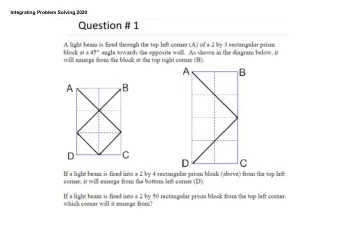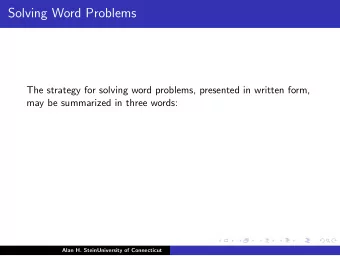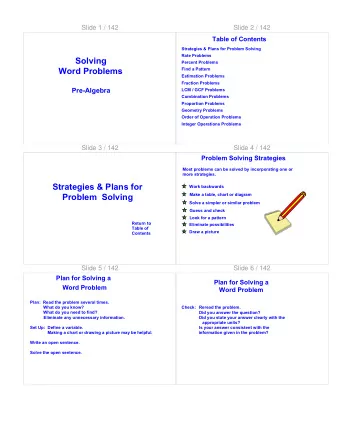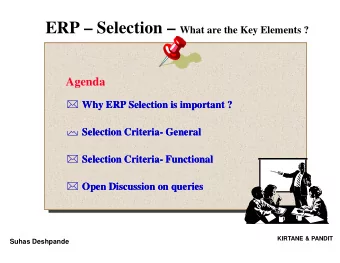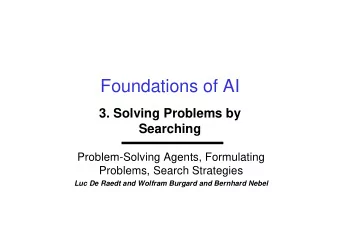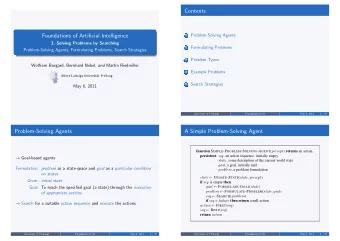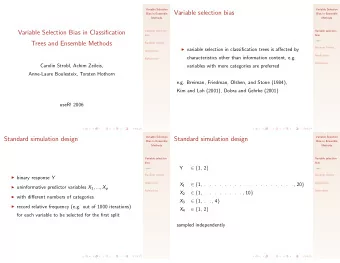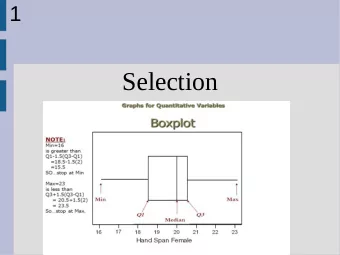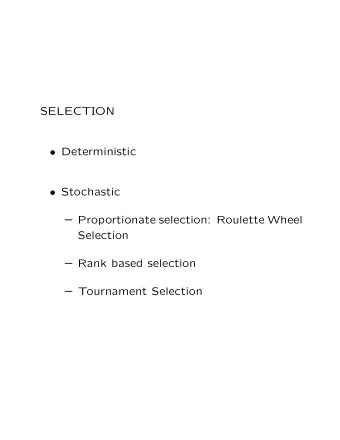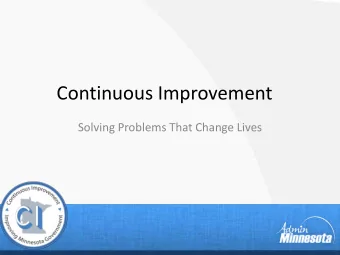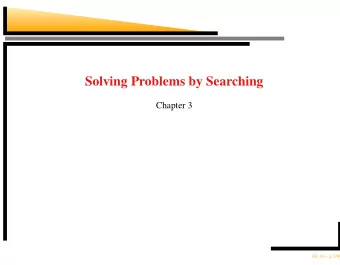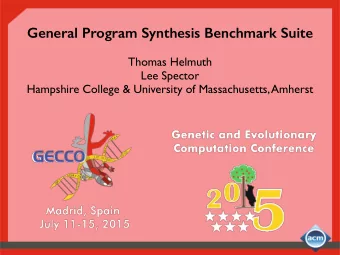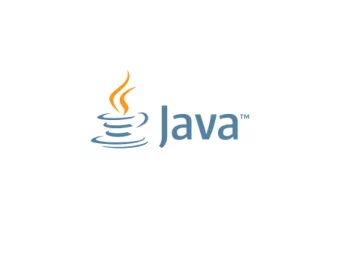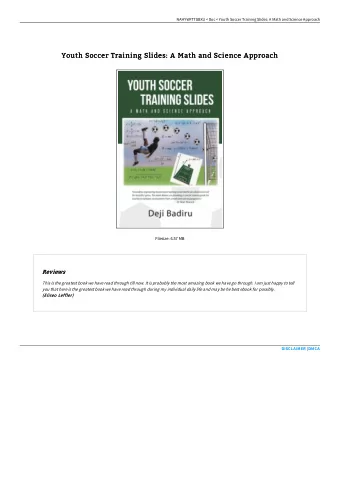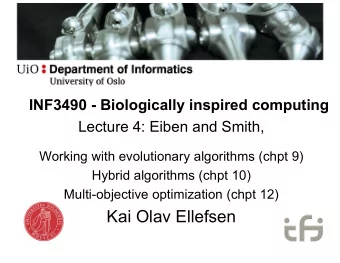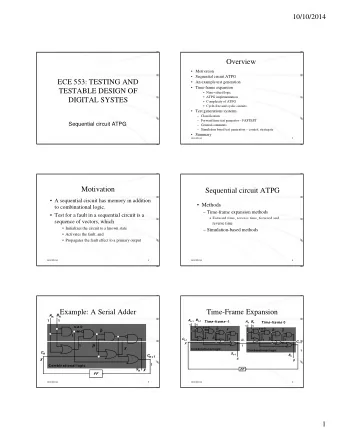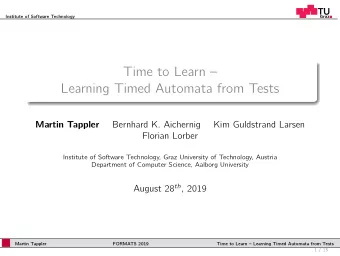
Solving Uncompromising Problems with Lexicase Selection in IEEE - PowerPoint PPT Presentation
Hot Off the Press! Solving Uncompromising Problems with Lexicase Selection in IEEE Transactions on Evolutionary Computation Thomas Helmuth, Lee Spector, and James Matheson Hampshire College & University of Massachusetts, Amherst Outline
Hot Off the Press! Solving Uncompromising Problems with Lexicase Selection in IEEE Transactions on Evolutionary Computation Thomas Helmuth, Lee Spector, and James Matheson Hampshire College & University of Massachusetts, Amherst
Outline • Lexicase selection • Modal and uncompromising problems • Four problems • Experimental results • Conclusions
Selection • In genetic programming, selection is typically based on average performance across all test cases (sometimes weighted, e.g. with "implicit fitness sharing") • In nature, selection is typically based on sequences of interactions with the environment
Lexicase Selection • Emphasizes individual test cases and combinations of test cases; not aggregated fitness across test cases • Random ordering of test cases for each selection event • Can DRAMATICALLY enhance the power of genetic programming to solve problems
Lexicase Selection To select single parent: 1. Shuffle test cases 2. First test case – keep best individuals 3. Repeat with next test case, etc. Until one individual remains The selected parent may be a specialist in the tests that happen to have come first, and may or may not be particularly good on average
Modal Problems • Require successful programs to do something qualitatively different in different circumstances • “Circumstances” vary across fitness cases • How many modes? How are they detected? May not be obvious in advance • Many software design problems (among others) are modal
Uncompromising Problems • Any acceptable solution must perform as well on each test case as it is possible to perform on that test case • Not acceptable for a solution to perform sub-optimally on any one test case in exchange for good performance on others • Many software design problems (among others) are uncompromising
Potential • Not only for modal or uncompromising problems • Other uses of selection in genetic programming • Other forms of evolutionary computation with case-like assessment • More to be done, e.g. for problems with continuous errors
Related Work • Multi-objective evolution (generally assumes objectives, which may not be factored by input, are known in advance) • Multi-modal problems (generally refers to problems with multiple global optima) • Lexicographic ordering in selection (but here we order fitness cases, in random order) • Ensemble methods (but here we seek a single program perhaps with some code used for multiple modes)
Experiments • Problems • Finding discriminator terms in finite algebras • Designing digital multipliers • Symbolic regression of the factorial function • Automatic programming of "wc" (word count) • Genetic programming systems • Koza-style tree-based GP • PushGP • Selection • Lexicase • Tournament (various sizes) • Implicit Fitness Sharing (various tournament sizes)
Finite Algebras
Digital Multiplier • 3 bits x 3 bits => 6 bits
Factorial • Inputs 1!=1 to 10!=3628800 • Various forms of normalization for non-lexicase methods • Instructions for integers, booleans, execution stack (for conditional branches and recursion) • No high-level Push instructions that allow for trivial solutions
wc
wc Test Cases • 0 to 100 character files • Random string (200 training, 500 test) • Random string ending in newline (20 training, 50 test) • Edge cases (22; empty string, multiple newlines, etc.)
Instructions • General purpose • I/O • Control flow • Tags for modularity • String, integer, and boolean • Random constants
Implicit Fitness Sharing • Scale errors per case based on population-wide error • Non-binary version
Push • Designed for program evolution • Data flows via stacks, not syntax • One stack per type: integer, float, boolean, string, code, exec, vector, ... • Rich data and control structures • Minimal syntax: program → instruction | literal | ( program* ) • Uniform variation, meta-evolution
Parameters
A1 Results
A2 Results
Digital Multiplier Results
Factorial Results
wc Results
Diversity
Cost
Future • Try lexicase selection on your problems and in your systems! • Investigate how/when/why lexicase selection helps • Improve performance where it helps less, e.g. for problems with continuous errors • Decrease cost • Look for Tom Helmuth's dissertation, to appear soon
Thanks • Members of the Hampshire College Computational Intelligence Lab. • This material is based upon work supported by the National Science Foundation under Grants No. 1017817, 1129139, and 1331283. Any opinions, findings, and conclusions or recommendations expressed in this publication are those of the authors and do not necessarily reflect the views of the National Science Foundation.
Recommend
More recommend
Explore More Topics
Stay informed with curated content and fresh updates.
